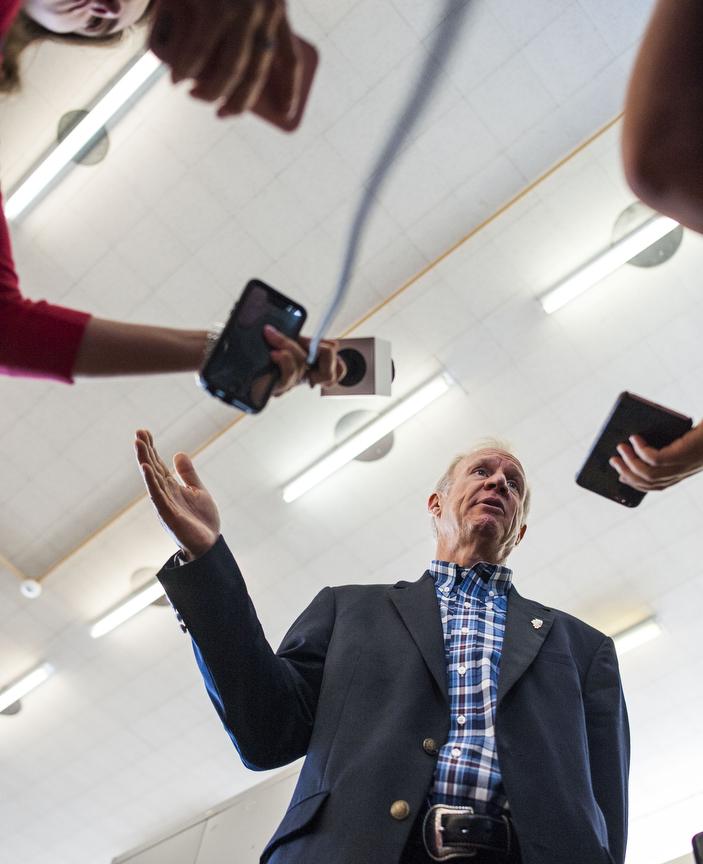Rauner says final budget package must have sufficient ‘structural change’ to gain his support
Illinois Gov. Bruce Rauner speaks with members of the media Friday, Aug. 26, 2016, following his visit to Carbondale High School’s Rebound program. (Ryan Michalesko | @photosbylesko)
February 2, 2017
Republican Gov. Bruce Rauner said Wednesday that he will offer state lawmakers this month a budget proposal in the same format that the Democratic-led General Assembly rejected last year — either work with him on crafting a balanced spending plan or give him more power to make cuts on his own.
Appearing before the Chicago Tribune Editorial Board, Rauner said he was “heartened” by recent efforts in the state Senate to reach a compromise to end Illinois’ historic budget stalemate and address some governmental and pro-business changes he has sought. But he also acknowledged he might find any final package insufficient in making “structural change” to gain his support.
Additionally, the governor said he had no involvement in the strategy of the state Republican Party — which he heavily subsidizes — to try to demonize his chief political nemesis, Democratic House Speaker Michael Madigan. While Madigan’s support is seen as a necessary ingredient for achieving a compromise to end the stalemate, Rauner called the political attacks on the Democrat “irrelevant” to governing.
Advertisement
Rauner’s hourlong appearance ended shortly before Fitch Ratings issued another downgrade of state borrowing to BBB — two notches above “junk” status. Fitch cited “the unprecedented failure of the state to enact a full budget for two consecutive years and the financial implications of spending far in excess of available revenues.”
Rauner’s decision last year to present a spending plan that included the option of letting lawmakers give him the power to make massive cuts was never really considered by Democrats in the General Assembly. They said Rauner needed to specify where he intended to cut spending.
“Either the General Assembly authorizes me to make cuts, not my first choice but I’ll do that, or let’s work together to do a balanced budget with cuts and, what I prefer is, a balance of cuts, some revenues and major structural change. The real important thing is the structural change,” Rauner said.
“Structural change” is how Rauner has described his agenda, which includes changes to the state workers’ compensation system, union collective bargaining rights and public worker pensions — issues affecting Democratic allies such as civil attorneys and unions. Rauner also is seeking a property-tax freeze, term limits for elected officials and a plan to remove much of the politics out of the every-decade redrawing of legislative district boundaries.
Madigan has not embraced much of Rauner’s agenda over the first two years of his term, and the two haven’t agreed to a full state budget in that time.
“What’s going to be different (this year), I hope, is that the process for the General Assembly will actually, for the first time, be collaborative and we’ll together get a balanced budget, together get structural change,” Rauner said.
Democratic Senate President John Cullerton and Senate Republican leader Christine Radogno have been collaborating on a sweeping package of proposals to address some of Rauner’s agenda items. It also includes a state income tax increase and a trade-off on business taxation as a foundation for a spending plan for the end of this budget year and all of the next one.
Advertisement*
Rauner said he wants “structural change that actually moves the needle. We in Illinois have a habit of reforming things or changing things, but in headline only, not in reality. We’ve got to do it in reality.”
But Rauner said he is purposely staying out of the Senate negotiations and not offering individual lawmakers advice on portions of the package he supports or disagrees with.
“I think a deal is more likely to happen if it’s organic, coming from the rank-and-file members of the General Assembly, and the important thing is to get a good compromise. I’ve been very clear. I mean, the good news and bad news is nobody’s wondering what I think is the right thing to do,” he said.
But the Senate package continues to evolve, with members of the chamber’s Republican minority concerned it doesn’t do enough to help businesses. There are questions among them whether Rauner would support a final product if they vote for it.
Asked if it was possible that a Senate proposal might lack the significant trade-offs needed to balance his agenda and funding needs through higher taxes, Rauner said “it’s possible.”
“I don’t want to weigh in on specific content of bills and I have not done that,” Rauner said. Instead, he has told lawmakers “think about it from a job creator’s point of view. Make it really matter. This has really got to matter.”
“Psychologically it’s a cultural shift in the General Assembly. It’s monumental,” Rauner said of seeking a balanced budget, something he said the state has lacked for “decades.”
“Folks are not used to two principles that I stated when I came into office — that I was not going to sign unbalanced budgets and that if new tax revenue was to be part of the budget creation that we (also) would need structural change to grow,” he said.
Throughout his appearance, Rauner declined to offer many specifics on several issues. He promised that a task force looking for “innovative” approaches to dealing with Chicago’s violence problem would be “coming with some pretty big things” soon. He also said the state was “woeful” in its number of technology companies and would roll out a tech recruitment plan.
He said he has not been involved in the strategy behind efforts by the state Republican Party and Republican legislative campaigns that began in earnest last year to attack Madigan, who has served as speaker for all but two years since 1983.
Rauner, a wealthy former equity investor, last year gave $21 million from his campaign fund to the state GOP and another $12 million personally and in campaign funds to House Republican leader Jim Durkin, of Western Springs.
Even after the election, the GOP has kept up its efforts to focus on Madigan, unsuccessfully urging Democrats not to back him for a 17th term as speaker and more recently trying to tie him to potential 2018 challengers to Rauner.
“I literally don’t get involved in that. I don’t coach it. I don’t recommend,” the governor said.
“I believe in a two-party system and I have supported the party that was virtually nonexistent. Beyond financial support, I literally don’t have the time or frankly the interest,” he said.
Asked whether the attacks on Madigan could undercut efforts to reach a compromise to end the stalemate, Rauner said, “I don’t think it matters one way or the other.”
“This is the life we’ve chosen. We all live in a world — I take incoming every day. … I couldn’t care less. Say what you want,” he said.
“That’s one of the best advices Rich Daley ever gave me: He said, ‘Don’t read any press about you and don’t watch any of the ads’ and I never have, I never have. And you know what? Life is good. Just spell my name right. I don’t really care. And anybody on the other side thinks, ‘Oh, I’m a politician but you can’t say anything mean about me otherwise I won’t negotiate?’ Oh come on. Grow up. I mean, we’re not in third grade,” he said.
With the budget stalemate continuing, Attorney General Lisa Madigan went to court last week to lift an order that has kept state workers paid even though Illinois has no spending plan in place. Rauner criticized that move, and Democratic lawmakers in the House are weighing the possibility of pushing legislation to keep paychecks flowing if the order is lifted.
Rep. Lou Lang, D-Skokie, said that while the attorney general’s legal reasoning may be sound, lawmakers “want state employees to be paid.” While the legislation has yet to be drafted, Lang said the idea behind the one-time funding agreement is to keep paychecks flowing through July 1, when the current budget year ends.
Lang said it was of particular importance to provide some stability for workers “at a time when there is a significant amount of friction between the governor” and the state’s largest employee union. Members of the American Federation of State, County and Municipal Employees Council 31 are in the process of voting on whether to strike amid stalled contract talks with Rauner’s office.
“I think it’s important we establish that we support state employees,” Lang said.
Last year, Illinois spent roughly $3.2 billion on employee salary and related benefits, according to figures from the comptroller’s office.
Republicans are pushing an alternative plan that would change state law to reclassify salaries to ensure money would go out the door automatically regardless of whether a budget is in place. Sponsoring Rep. Avery Bourne, R-Raymond, argues the measure is a long-term solution versus a temporary fix that allows worker pay to be used “as a political pawn.”
___
(c)2017 the Chicago Tribune
Visit the Chicago Tribune at www.chicagotribune.com
Distributed by Tribune Content Agency, LLC.
Advertisement








